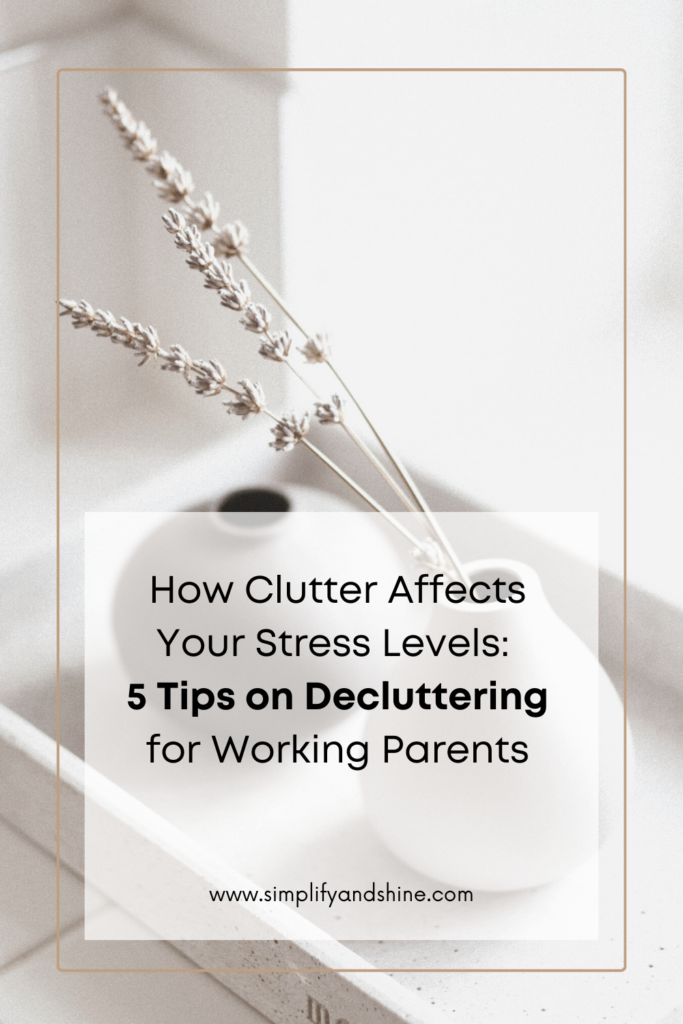How Clutter Affects Your Stress Levels: 5 Tips on Decluttering for Working Parents
As a working parent, you probably have a lot on your plate, and clutter may be the last thing on your mind. However, did you know that clutter can have a direct impact on your stress levels? According to a study published in the Personality and Social Psychology Bulletin, people with cluttered homes were more likely to feel depressed, and fatigued, and have higher levels of cortisol, a stress hormone. In this blog post, we’ll discuss how clutter affects your stress levels and provide tips on decluttering your home to reduce your stress and promote a more minimalist lifestyle.
As we move into April, it’s worth noting that its Stress Awareness Month. This is a time to raise awareness about the impact of stress on our mental and physical health and to explore strategies for managing stress in our daily lives. One way to reduce stress is by decluttering your home. By creating a more organized and minimalist living space, you can eliminate visual noise and distractions, making it easier to relax and unwind after a long day. So, in honour of Stress Awareness Month, let’s talk a little more about the link between clutter and stress, and explore some tips for decluttering your home to reduce your stress levels.
RELATED: HOW TO SIMPLIFY YOUR LIFE AND WHY YOU SHOULD
How Clutter Affects Your Stress Levels
Clutter can have a significant impact on your mental health and well-being. Here are some ways clutter affects your stress levels:
1 Increases Anxiety and Overwhelm
When you’re surrounded by clutter, it can be overwhelming and lead to feelings of anxiety. It’s hard to focus on work or relax when you’re constantly surrounded by a mess. A study by the University of California found that people who had cluttered homes had higher levels of cortisol, which is associated with stress.
2 Creates a Feeling of Being Stuck
Clutter can make you feel like you’re stuck in your current situation. It’s hard to move forward or make changes when you’re surrounded by things you don’t need or use. This can lead to feelings of frustration and stress.
3 Drains Your Energy
When your home is cluttered, it can be draining on your energy levels. It takes more mental and physical energy to navigate through a cluttered space, which can leave you feeling tired and stressed.
Tips on Decluttering for Working Parents
Now that you know how clutter affects your stress levels, it’s time to take action. Here are some tips on decluttering your home to reduce your stress levels:
Start Small
Decluttering can be overwhelming, especially if you have a lot of stuff. Start small by choosing one room or area to declutter. Set a timer for 15-30 minutes and focus on decluttering just that space. You’ll be surprised at how much you can accomplish in a short amount of time.
Get Rid of Items You Don’t Need or Use
Be honest with yourself about what you need and use. If you haven’t used an item in the past six months, it’s probably time to get rid of it. You can donate, sell, or recycle items that are in good condition.
Organize Your Space
Once you’ve decluttered your space, it’s time to organize it. Use storage solutions like baskets, bins, and shelves to keep things in order. Make sure everything has a designated place, so you can easily find what you need.
RELATED: 28-DAY SIMPLICITY CHALLENGE
Set Realistic Goals
Decluttering your home can be a time-consuming process, especially if you have a lot of items to go through. Setting realistic goals can help you stay motivated and avoid feeling overwhelmed. Break down your decluttering goals into smaller, achievable tasks, such as decluttering one shelf or drawer per day.
Practice Mindful Consumption
One of the best ways to prevent clutter from accumulating in your home is by practising mindful consumption. This means being intentional about what you bring into your home and avoiding impulse purchases. Before making a purchase, ask yourself if you really need the item and whether it aligns with your values and priorities. By being more mindful about what you consume, you can reduce the amount of clutter in your home and promote a more minimalist lifestyle.

Conclusion
Clutter can have a direct impact on your stress levels, and as a working parent, you don’t need any additional stress in your life. By decluttering your home and adopting a more minimalist lifestyle, you can reduce your stress levels and create a more peaceful environment for you and your family. Start small, get rid of items you don’t need, and organize your space. Your mental health and well-being will thank you.




